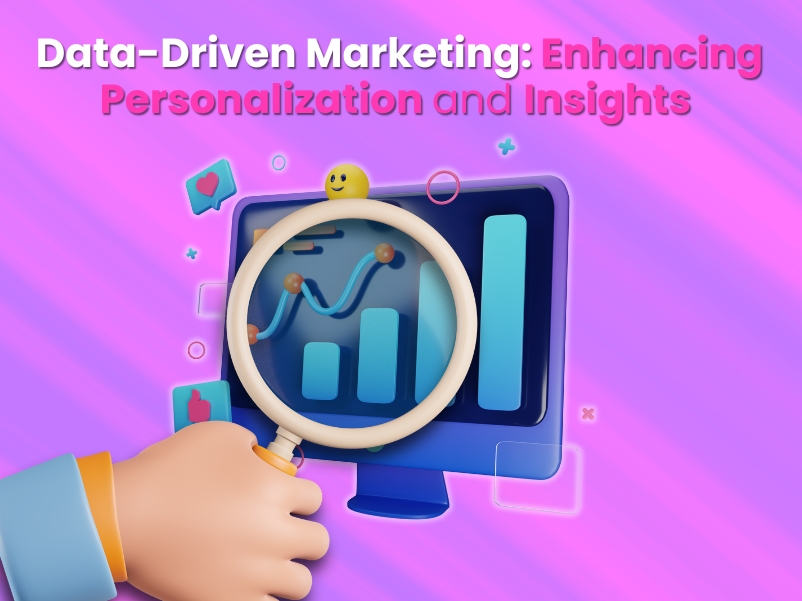In the ever-evolving world of digital marketing, data-driven strategies are transforming how brands engage with their audiences. With advancements in data analytics and artificial intelligence (AI), marketers can now offer highly personalized experiences that drive customer satisfaction and loyalty. This blog will discuss the importance of data-driven strategies, how to effectively use customer insights, and the impact of AI on marketing personalization.
The Importance of Data-Driven Strategies
Data-driven marketing involves using data insights to inform and optimize marketing strategies. By analyzing data from various sources, brands can gain a deeper understanding of their customers’ behaviors, preferences, and needs. Here’s why data-driven strategies are crucial:
- Enhanced Personalization
- Tailored Experiences: Data-driven marketing enables brands to create personalized experiences for each customer, increasing engagement and satisfaction.
- Relevant Content: By understanding customer preferences, brands can deliver more relevant content, offers, and recommendations.
- Improved Decision-Making
- Data Insights: Data provides valuable insights that help marketers make informed decisions, reducing guesswork and increasing efficiency.
- Performance Metrics: Tracking performance metrics allows brands to measure the effectiveness of their campaigns and make data-backed adjustments.
- Higher ROI
- Targeted Campaigns: By targeting the right audience with the right message, data-driven marketing can significantly improve return on investment (ROI).
- Resource Optimization: Data helps in optimizing marketing resources, ensuring efforts are focused on high-impact areas (Smart Insights) .
Effectively Using Customer Insights
To harness the power of customer insights, brands need to collect, analyze, and act on data from various touchpoints. Here are some steps to effectively use customer insights:
- Collecting Data
- Surveys and Feedback: Use surveys and feedback forms to gather direct insights from customers.
- Web Analytics: Track website behavior to understand how customers interact with your site.
- Social Media: Monitor social media interactions to gauge customer sentiment and preferences.
- Analyzing Data
- Segmentation: Segment your audience based on demographics, behavior, and preferences to deliver more targeted marketing.
- Predictive Analytics: Use predictive analytics to forecast future behaviors and trends, helping you stay ahead of customer needs.
- Acting on Insights
- Personalized Campaigns: Create personalized marketing campaigns based on the insights gathered from your data analysis.
- Continuous Optimization: Regularly review and optimize your campaigns based on performance data to ensure continuous improvement (Smart Insights) .
The Impact of AI on Marketing Personalization
AI is a game-changer in the realm of data-driven marketing, offering unprecedented capabilities for personalization. Here’s how AI enhances marketing efforts:
- Advanced Personalization
- Dynamic Content: AI can deliver dynamic content that changes based on individual user behavior and preferences in real-time.
- Recommendation Engines: AI-powered recommendation engines suggest products or content that align with a customer’s interests, boosting engagement and sales.
- Automated Insights
- Pattern Recognition: AI algorithms can analyze vast amounts of data to identify patterns and trends that humans might miss.
- Real-Time Analysis: AI can process data in real-time, allowing brands to respond to customer behavior instantly.
- Enhanced Customer Experience
- Chatbots and Virtual Assistants: AI-driven chatbots provide personalized customer support, improving the overall customer experience.
- Predictive Personalization: AI can predict customer needs and preferences, enabling brands to proactively offer relevant products and services .
Conclusion
Data-driven marketing is essential for creating personalized, effective, and efficient marketing strategies. By leveraging customer insights and AI, brands can enhance personalization, improve decision-making, and achieve higher ROI. Embrace data-driven strategies today to stay ahead in the competitive digital landscape.
Get Started with Data-Driven Marketing!
How are you using data in your marketing strategy? Share your experiences in the comments below!



